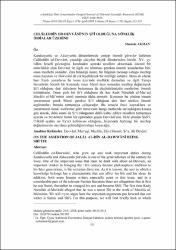CELÂLEDDÎN ED-DEVVÂNÎ’NİN Şİ‘Î OLDUĞUNA YÖNELİK İDDİALAR ÜZERİNE
Özet
Karakoyunlu ve Akkoyunlu dönemlerinde yetişip önemli görevler üstlenenCelâleddîn ed-Devvânî, yaşadığı yüzyılın büyük âlimlerinden biridir. XV. yy.İslâm felsefî geleneğini, kendinden sonraki nesillere aktarmada önemli birmütefekkir olan Devvânî ile ilgili ele alınması gereken önemli konulardan biri,onun mezhebî yönüdür. Zira bilindiği üzere, bir bilginin mensup olduğu mezheponun hayatını ve fikirlerini de etkileyebilecek bir özelliğe sahiptir. Buna ek olarakbazı İranlı yazarların bu konu üzerinde özellikle durmaları ve ilgili Farsçaliteratürün önemli bir kısmında onun Sünnî iken sonradan mezhep değiştirerekŞi‘î olduğuna dair iddiaların bulunması da düşünürümüzün mezhebini önemlikılmaktadır. Onun gizli bir Şi‘î olduğunu ilk kez Kadı Nûrullah el-Mar‘aşîMecâlis el-Mü’minîn isimli eserinde iddia etmiştir. Konunun bu yönüne binaenyazarımızın gerek Sünnî, gerekse Şi‘î olduğuna dair ileri sürülen önemliargümanları burada tartışmaya çalışacağız. Bu amaçla önce kaynaklara veyazarımızın kendi eserlerine göre meselenin hangi merkezde tartışıldığına kısacagöz atacak, daha sonra da Şi‘î olduğunun delili kabul edilen misalleri tartışmayaaçacak ve böylelikle Sünnî bir eğitimden geçen Devvânî’nin, fıkhî yönden Şâfi‘î,i‘tikâdî açıdan ise Eş‘arî kelâmcısı olduğunu, hayatında herhangi bir mezhepdeğiştirmenin meydana gelmediğini ortaya koyacağız. Celâleddîn ed-Daww?n?, who grew up and took important duties during Karakoyunlu and Akkoyunlu periods, is one of the great scholars of the century he lived. One of the important issue that must be dealt with about ed-Devvani, an important thinker in bringing the 18th century Islamic philosophical tradition to his later generations, is his sectarian direction. As it is known, the sect in which a knowledge belongs has a characteristic that can affect his life and his ideas. In addition, both some Iranian writers especially point to this issue, and in a considerable part of the relevant Persian literature there are allegations that at first he was Sunni, thereafter he changed his sect and became Shi'i. The first time Kady Nurullah al-Mar'ashî alleged that he was a secret Shi in the work of Mecâlis al- Mu'minin. We will try to argue here the important arguments put forward that our writer is Sunni, and Shi'i. For this purpose, we will first briefly look at which center his position is according to the sources and the own writings of our writer, and then we will open to discuss the examples considered to be the proof of his being Shi'i, and thus we will reveal that Daww?n?, which is based on Sunni education, is Shafi'i from the aspect of fiqh, Ash’ari theologian in terms of faith and also no sectarian change in his life.
Kaynak
e-Şarkıyat İlmi Araştırmalar DergisiCilt
10Sayı
1Bağlantı
https://doi.org/10.26791/sarkiat.381995https://app.trdizin.gov.tr/makale/TWpreE56STBOQT09
https://hdl.handle.net/20.500.11857/1923



















